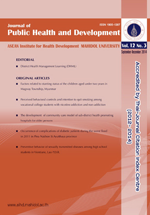Factors associated with mild cognitive impairment among the community-dwelling elderly in the urban area of Kyauk Tan Township, Myanmar
Main Article Content
Abstract
Dementia and its related cognitive impairment diseases are one of the main contributors of disability in older people. This study is aimed for screening of the elderly population with mild cognitive impairment (MCI) in the urban area of Kyauk Tan Township in Yangon Region, Myanmar and also identifying the important associated factors of MCI in the local context. A cross-sectional study design was conducted in the form of household visit interviews by using the structured questionnaires for 350 elderly in the urban area of Kyauk Tan Township.
The prevalence of mild cognitive impairment was 21% with the mean age of 70 years. Using Chi-square test for association, significantly associated factors with MCI included four socio-demographic factors (age, gender, education, and occupation), five life-style factors (alcohol drinking, physical activeness, regular meal, leisure activities and fish intake), one comorbid factor (depression), three family factors (individual income, family income and family support) and all three social factors (social network, social activities, and
religiousness). Five factors including age, education level, physical activities, leisure activities and social network size were detected to have significant association with MCI when multiple logistic regressions was performed.
Investigation of MCI and associated factors is important for planning the intervention programs effectively for the cognitive functional ability among the elderly.


